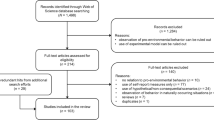Abstract
Many empirical studies examine the performance of pro-environmental behavior. A review of 49 recent studies revealed 42 unique measures of pro-environmental behavior. Analysis of these studies indicates a lack of consistency among the various behavioral measures. To address the issue of inconsistency in such a critical variable, I developed a new measure, the Pro-Environmental Behavior Scale (PEBS). The behaviors included in this scale are those identified by environmental scientists as having the greatest impact on the environment. Principal components analysis generated a 19-item scale with four dimensions. Coefficient alpha for the full scale was .76. Coefficient alphas for the subscales ranged from .62 to .74. Bivariate Pearson correlations between the PEBS and the New Ecological Paradigm Scale, the Environment Identity Scale, and the Environmental Regulations Attitude Scale demonstrated the scale’s construct validity. Test-retest correlations were strong, demonstrating reliability of the PEBS.
Similar content being viewed by others
Notes
The 49 studies are identified by an asterisk in the reference list.
References
*Studies included in the review.
Ajzen, I. (1985). From intentions to actions: a theory of planned behavior. In Beckmann, J. (ed.), Action Control: From Cognition to Behavior. Springer, Heidelberg, pp. 11–39.
*Armel, K., Yan, K., Todd, A., and Robinson, T. N. (2011). The Stanford Climate Change Behavior Survey: Assessing Greenhouse Gas Emissions-Related Behaviors in Individuals and Populations. Climatic Change 109(3/4): 671–694.
*Axelrod, L. J., and Lehman, D. R. (1993). Responding to Environmental Concerns: What Factors Guide Individual Action? Journal of Environmental Psychology 13: 149–159.
*Barr, S. (2007). Factors Influencing Environmental Attitudes and Behaviors: A Study of Household Waste Management. Environment and Behavior 39(4): 435–473.
Bostrom, A., O’Connor, R., Bohm, G., Hanss, D., Bodi, O., Ekstrom, F., Halder, P., Jeschke, S., and Saelensminde, I. (2012). Causal Thinking and Support for Climate Change Policies: International Survey Findings. Global Environmental Change 22: 210–222.
*Bratt, C. (1999). Consumers’ Environmental Behavior: Generalized, Sector-Based, or Compensatory? Environment and Behavior 31(1): 28–44.
Brower, M., and Leon, W. (1999). The Consumer’s Guide to Effective Environmental Choices: Practical Advice from the Union of Concerned Scientists. Three Rivers Press, New York.
*Chao, Y., and Lam, S. (2011). Measuring Responsible Environmental Behavior: Self-Reported and Other-Reported Measures and their Differences in Testing a Behavioral Model. Environment and Behavior 43(1): 53–71.
*Cottrell, S. P., and Graefe, A. R. (1997). Testing a Conceptual Framework of Responsible Environmental Behavior. Journal of Environmental Education 29(1): 17–28.
*Davis, J. L., Green, J.D., and Reed, A. (2009). Interdependence with the Environment: Commitment, Interconnectedness, and Environmental Behavior. Journal of Environmental Psychology 29(2): 173–180.
*Davis, J. L., Le, B., and Coy, A. E. (2011). Building a Model of Commitment to the Natural Environment to Predict Ecological Behavior and Willingness to Sacrifice. Journal of Environmental Psychology 31: 257–265.
*Dono, J., Webb, J., and Richardson, B. (2010). The Relationship Between Environmental Activism, Pro-Environmental Behavior and Social Identity. Journal of Environmental Psychology 30: 178–186.
Douglas, M. (2006). Grid-Group Cultural Theory. University of Toronto Press, Toronto.
Dunlap, R. E., Van Liere, K. D., Mertig, A. G., and Jones, R. E. (2000). Measuring Endorsement of the New Ecological Paradigm: A Revised NEP Scale. Journal of Social Issues 56(3): 425–442.
*Esa, N. (2010). Environmental Knowledge, Attitude and Practices of Student Teachers. International Research in Geographical and Environmental Education 19(1): 39–50.
Fishbein, M., and Ajzen, I. (1975). Belief, Attitude, Intention, and Behavior: An Introduction to Theory and Research. Addison-Wesley, Reading.
*Gadene, D., Sharma, B., Kerr, D., and Smith, T. (2011). The Influence of Consumers’ Environmental Beliefs and Attitudes on Energy Saving Behavior. Energy Policy 39: 84–94.
*Gatersleben, B., Steg, L., and Vlek, C. (2002). Measurement and Determinants of Environmentally Significant Consumer Behavior. Environment and Behavior 34: 335–362.
Hardin, G. (1968). The Tragedy of the Commons. Science 162: 1243–1248.
*Holbert, R. L., Kwak, N., and Shah, D. (2003). Environmental Concern, Patterns of Television Viewing, and Pro-Environmental Behaviors. Journal of Broadcasting and Electronic Media 47(2): 177–196.
*Homburg, A., and Stolberg, A. (2006). Explaining Pro-Environmental Behavior with a Cognitive Theory of Stress. Journal of Environmental Psychology 26: 1–14.
*Hunter, L., Hatch, A., and Johnson, A. (2004). Cross-National Gender Variation in Environmental Behaviors. Social Science Quarterly 85(3): 676–694.
*Iwata, O. (2004). Some Psychological Correlates of Environmentally Responsible Behavior. Social Behavior and Personality 32(8): 703–714.
*Kaiser, F. G., and Gutscher, H. (2003). The Proposition of a General Version of the Theory of Planned Behavior: Predicting Ecological Behavior. Journal of Applied Social Psychology 33(3): 586–603.
*Kaiser, F. G., and Schultz, P. W. (2009). The Attitude–Behavior Relationship: A Test of Three Models of the Moderating Role of Behavioral Difficulty. Journal of Applied Social Psychology 39(1): 186–207.
*Kaiser, F. G. and Wilson, M. (2000). Assessing People’s General Ecological Behavior: A Cross-Cultural Measure. Journal of Applied Social Psychology 30: 952–978.
*Kaiser, F. G., Wolfing, S., and Fuhrer, U. (1999). Environmental Attitude and Ecological Behavior. Journal of Environmental Psychology 19: 1–19.
*Karp, D. G. (1996). Values and Their Effects on Pro-Environmental Behavior. Environment and Behavior 28: 111–133.
*Korfiatis, K., Hovardas, T., and Pantis, J. D. (2004). Determinants of Environmental Behavior in Societies in Transition: Evidence from Five European Countries. Population and Environment 25(6): 563–584.
*Lang, K. B. (2011). The Relationship between Academic Major and Environmentalism Among College Students. The Journal of Environmental Education 42(4): 203–215.
*Larson, L. R., Whiting, J. W., and Green, G. T. (2011). Exploring the Influence of Outdoor Recreation Participation on Pro-Environmental Behavior in a Demographically Diverse Population. Local Environment 16(1): 67–86.
*Lee, J. A., and Holden, S. J. (1999). Understanding the Determinants of Environmentally Conscious Behavior. Psychology and Marketing 16(5): 373–392.
*Levine, D. S., and Strube, M. J. (2012). Environmental Attitudes, Knowledge, Intentions and Behaviors among College Students. The Journal of Social Psychology 52(3): 308–326.
*Martensson, M., and Pettersson, R. (2003). Everyday life contexts and the environment. In Biel, A., et al. (eds.), Individual and Structural Determinants of Environmental Practice. Ashgate Publishing, Burlington, pp. 26–65.
*Milfont, T. L. (2009). The Effects of Social Desirability on Self-Reported Environmental Attitudes and Ecological Behavior. Environmentalist 29: 263–269.
*Milfont, T. L., and Duckitt, J. (2004). The Structure of Environmental Attitudes: A First- and Second-Order Confirmatory Factor Analysis. Journal of Environmental Psychology 24: 289–303.
*Milfont, T. L., Duckitt, J., and Cameron, L. D. (2006). A Cross-Cultural Study of Environmental Motive Concerns and Their Implications for Pro-Environmental Behavior. Environment and Behavior 38(6): 745–767.
*Mobley, C., Vagias, W. M., and DeWard, S. (2010). Exploring Additional Determinants of Environmentally Responsible Behavior. Environment and Behavior 43(4): 420–447.
*Nisbet, E., Zelenski, J. M., and Murphy, S.A. (2009). The Nature Relatedness Scale: Linking Individuals’ Connection with Nature to Environmental Concern and Behavior. Environment and Behavior 41(5): 715–740.
*Ollie, E., Grendstad, G., and Wollebaek, D. (2001). Correlates of Environmental Behaviors: Bringing Back Social Context. Environment and Behavior 33(2):181–208.
*Oreg, S., and Katz-Gerro, T. (2006). Predicting Pro-Environmental Behavior Cross-Nationally: Values, the Theory of Planned Behavior, and Value-Belief Norm Theory. Environment and Behavior 38(4): 462–483.
Pallant, J. (2005). SPSS Survival Manual. Open University Press, Chicago.
*Pelletier, L. G., Tuson, K., Green-Demers, I., Noels, K., and Beaton, A. M. (1998). Why are You Doing Things for the Environment?: The Motivation Toward the Environment Scale (MTES). Journal of Applied Social Psychology 28(5): 437–468.
*Pfeffer, M., and Stycos, J. M. (2002). Immigrant Environmental Behaviors in New York City. Social Science Quarterly 83(1): 64–82.
*Poortinga, W., Steg, L., and Vlek, C. (2004). Values, Environmental Concern and Environmental Behavior. Environment and Behavior 36(1): 70–93.
Reynolds, T. W., Bostrom, A., Read, D., and Morgan, M. G. (2010). Now What Do People Know about Global Climate Change?: Survey Studies of Educated Laypeople. Risk Analysis 30: 1520–1538.
*Scannell, L., and Gifford, R. (2010). The Relations Between Natural and Civic Place Attachment and Pro-Environmental Behavior. Journal of Environmental Psychology 30(3): 289–297.
*Schultz, P. W., Gouveia, V., Cameron, L. D., Tankha, G., Schmuck, P., and Franek, M. (2005). Values and Their Relationship to Environmental Concern and Conservation Behavior. Journal of Cross Cultural Psychology 36(4): 457–475.
*Steel, B. S. (1996). Thinking Globally and Acting Locally?: Environmental Attitudes, Behavior, and Activism. Journal of Environmental Management 47(1): 27–36.
Stehfest, E., Bouwman, L., van Vuuren, D., den Elzen, M. G., Eickhout, B., and Kabat, P. (2009). Climate Benefits of Changing Diet. Climatic Change 95: 83–102.
Stern, P. C. (2000). Toward a Coherent Theory of Environmentally Significant Behavior. Journal of Social Issues 56(3): 407–424.
Stern, P. C., and Gardner, G. T. (1981). Psychological Research and Energy Policy. American Psychologist 36: 329–342.
Stern, P. C., and Oskamp, S. (1987). Managing scarce environmental resources. In Altman, I., and Stokols, D. (eds.), Handbook of Environmental Psychology. Wiley, New York, pp. 1043–1088.
Stern, P. C., Dietz, T., and Guagnanao, G. A. (1995). The New Environmental Paradigm in Social Psychological Perspective. Environment and Behavior 27: 723–745.
Stern, P. C., Dietz, T., Ruttan, V. W., Socolow, R. H., and Sweeney, J. L. (1997). Strategies for setting research priorities. In Stern, P. (ed.), Environmentally Significant Consumption: Research Directions. National Academy Press, Washington, pp. 124–137.
*Stern, P. C., Dietz, T., Able, T., Guagnanao, G. A., and Kalof, L. (1999). A Value-Belief-Norm Theory of Support for Social Movements. Human Ecology Review 6: 81–97.
*Stets, J. E., and Biga, C. F. (2003). Bringing Identity Theory into Environmental Sociology. Sociological Theory 21(4): 398–423.
*Thapa, B. (2010). The Mediation Effect of Outdoor Recreation Participation on Environmental Attitude-Behavior Correspondence. The Journal of Environmental Education 41: 133–150.
*Thogersen, J. (2006). Norms for Environmentally Responsible Behavior: An Extended Taxonomy. Journal of Environmental Psychology 26: 247–261.
Thompson, M., Ellis, R., and Wildavsky, A. (1990). Cultural Theory. Westview Press, Boulder.
*Tobler, C., Visschers, V. H., and Seigrist, M. (2012). Addressing Climate Change: Determinants of Consumers’ Willingness to Act and to Support Policy Measures. Journal of Environmental Psychology 32: 197–207.
Van Liere, K., and Dunlap, R. E. (1981). Environmental Concern: Does it Make a Difference How It’s Measured? Environment and Behavior 13(6): 651–676.
*Walton, T., and Austin, D. M. (2011). Pro-Environmental Behavior in an Urban Social Structural Context. Sociological Spectrum 31: 260–287.
Weigert, A. J. (1997). Self, Interaction, and Natural Environment. State University of New York Press, Albany.
*Whitmarsh, L. (2009). Behavioral Responses to Climate Change: Asymmetry of Intentions and Impacts. Journal of Environmental Psychology 29(1): 13–23.
*Whitmarsh, L., and O’Neill, S. (2010). Green Identity, Green Living? The Role of Pro-Environmental Identity in Determining Consistency across Diverse Pro-Environmental Behaviors. Journal of Environmental Psychology 30(3): 305–314.
*Zelezny, L. C., Chua, P., and Aldrich, C. (2000). Elaborating on Gender Differences in Environmentalism. Journal of Social Issues 56(3): 443–457.
Author information
Authors and Affiliations
Corresponding author
Rights and permissions
About this article
Cite this article
Markle, G.L. Pro-Environmental Behavior: Does It Matter How It’s Measured? Development and Validation of the Pro-Environmental Behavior Scale (PEBS). Hum Ecol 41, 905–914 (2013). https://doi.org/10.1007/s10745-013-9614-8
Published:
Issue Date:
DOI: https://doi.org/10.1007/s10745-013-9614-8




